|
|
|
Sort Order |
|
|
|
Items / Page
|
|
|
|
|
|
|
| Srl | Item |
| 1 |
ID:
186469


|
|
|
|
|
| Summary/Abstract |
Marine energy (i.e., energy from waves, tides, currents) in the United States is a nascent industry. In particular, permitting processes—an uncertainty for industry advancement that can be costly and time consuming to navigate—have rarely been tested and used for marine energy. The novelty of the marine energy industry and utilization of open ocean permitting processes that were not originally developed for marine energy have led to extensive efforts to gain consensus amongst state and federal regulatory agencies to authorize marine energy projects. In 2021, Oregon State University successfully completed permitting of a wave energy test facility, called PacWave South, off the coast of Oregon, which is designed to advance wave energy research and development. This article documents the multi-year process that Oregon State University used to receive federal and state authorization for a pre-permitted commercial-scale grid-connected facility by detailing the development of the test facility, management of uncertainty and challenges, and key decisions. The PacWave South case study provides insights for the larger marine energy community as the industry advances towards commercialization.
|
|
|
|
|
|
|
|
|
|
|
|
|
|
|
|
| 2 |
ID:
128419


|
|
|
|
|
| Publication |
2014.
|
| Summary/Abstract |
To date, academic research relating to Marine Renewable Energy (MRE) has largely focused on resource assessment, technical viability and environmental impact. Experiences from onshore renewable energy tell us that social acceptability is equally critical to project success. However, the specific nature of the marine environment, patterns of resource distribution and governance means experiences from onshore may not be directly applicable to MRE and the marine environment. This paper sets out an agenda for social studies research linked to MRE, identifying key topics for future research: (i) economic impacts; (ii) wealth distribution and community benefits; (iii) communication and knowledge flow; (iv) consultation processes; (v) dealing with uncertainty; (vi) public attitudes; and (vii) planning processes. This agenda is based on the findings of the first workshop of ISSMER, an international research network of social scientists with interests in marine renewable energy. Importantly, this research agenda has been informed by the experiences of developers, regulators and community groups in Orkney. The Orkney archipelago, off the north coast of Scotland, is home to the most intense cluster of MRE research, development and deployment activity in the world today.
|
|
|
|
|
|
|
|
|
|
|
|
|
|
|
|
| 3 |
ID:
113473
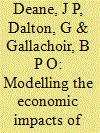

|
|
|
|
|
| Publication |
2012.
|
| Summary/Abstract |
This paper investigates the impacts of including 500 MW of wave power into Ireland's electricity generation portfolio in the year 2020. One year of detailed market simulations are undertaken to determine the impact on wholesale electricity prices, system operation costs and CO2 emissions with and without this installed wave power under a number carbon prices assumptions. In both scenarios (with and without wave energy), Ireland's installed renewable capacity is fixed such that 40% of Ireland's electricity in 2020 is from renewable source. The likely revenue a wave energy device would earn in the market is also investigated and compared with what is required to achieve 500 MW installed capacity. It is shown that in general the inclusion of wave energy has a negligible effect on wholesale electricity prices, reduces total system cost in Ireland and can increase CO2 emissions on the island of Ireland under certain carbon price assumptions. It is also shown the current REFIT for wave energy is adequate.
|
|
|
|
|
|
|
|
|
|
|
|
|
|
|
|
| 4 |
ID:
137751
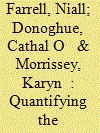

|
|
|
|
|
| Summary/Abstract |
Wave Energy Conversion (WEC) devices are at a pre-commercial stage of development with feasibility studies sensitive to uncertainties surrounding assumed input costs. This may affect decision making. This paper analyses the impact these uncertainties may have on investor, developer and policymaker decisions using an Irish case study. Calibrated to data present in the literature, a probabilistic methodology is shown to be an effective means to carry this out. Value at Risk (VaR) and Conditional Value at Risk (CVaR) metrics are used to quantify the certainty of achieving a given cost or return on investment. We analyse the certainty of financial return provided by the proposed Irish Feed-in Tariff (FiT) policy. The influence of cost reduction through bulk discount is also discussed, with cost reduction targets for developers identified. Uncertainty is found to have a greater impact on the profitability of smaller installations and those subject to lower rates of cost reduction. This paper emphasises that a premium is required to account for cost uncertainty when setting FiT rates. By quantifying uncertainty, a means to specify an efficient premium is presented.
|
|
|
|
|
|
|
|
|
|
|
|
|
|
|
|
| 5 |
ID:
104174
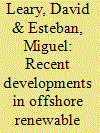

|
|
|
|
|
| Publication |
2011.
|
| Summary/Abstract |
This article examines the emergence of offshore renewable energy (i.e., offshore wind, ocean, and tidal energy) in the Asia-Pacific region with a particular focus on developments in China, South Korea, Australia, and New Zealand. It outlines plans for the development of offshore wind, tidal, and wave energy projects as well as emerging legal and policy measures supporting the growth of offshore renewable energy in the region. The article highlights that, although some progress has been made on laws and other measures to facilitate offshore renewable energy in the Asia-Pacific region, clear regulatory frameworks are still emerging in these jurisdictions.
|
|
|
|
|
|
|
|
|
|
|
|
|
|
|
|
| 6 |
ID:
155372
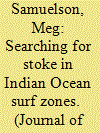

|
|
|
|
|
| Summary/Abstract |
This article takes up the idea of Indian Ocean ‘natural logics’ while shifting attention from ‘cultures of trade’ to leisure culture, and from monsoon winds to waves. Surfers who ride these bands of moving energy describe the experience as one of being ‘stoked’, and the search for stoke has over the past century propelled them around the world ocean in pursuit of the perfect wave. Focusing on the Indian Ocean arena, the article traces three distinct yet not necessarily sequential waves of surf travel therein: the ‘surfari’ and the concealment/exposure of secret spots; enclaves of consumption in the offshore coliseum; and, the swirling shore-break in which the energy parcel conveyed through the ocean is unloaded on the coast. In the process, it explores what insights Indian Ocean studies bring to cultural histories of surfing and how surfing practice has been reshaped as it moves out of its traditional Pacific – and then Atlantic – locations, along with the ways in which surfing has in turn reconfigured the Indian Ocean littoral. The article concludes by shifting mode from critical commentary in order to present the shore-break as a dynamic concept-metaphor for materializing immersed and energised scholarship.
|
|
|
|
|
|
|
|
|
|
|
|
|
|
|
|
| 7 |
ID:
125763
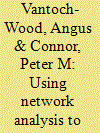

|
|
|
|
|
| Publication |
2013.
|
| Summary/Abstract |
The UK's wave energy sector is at a pre-commercial stage transitioning from prototype/demonstration towards a revenue supported industry. A host of advantages that could be realised through successful commercialisation include; the potential to generate 40-50 TWh/yr, £3.7bn of export, and 10,000+ jobs by 2020 (with tidal). Despite this, criticisms have been made about the lack of; coordination between funding bodies, communication between stakeholders and overly centralised actors. Although the value of strong problem solving networks has been noted, problems arise in validating the presence, nature and value of relationships as well as identification of tacit and informal linkages. Here network analysis is used to validate these criticisms and provide insight into sector activities. It is shown that although high levels of interaction are occurring overall, there are wide disparities. Prime movers are clearly present and less mature developers are isolated from the system as it develops norms and practices. This, combined with government fund gating has led to a Matthew effect whereby some have access to finance and are shaping institutional norms while others struggle. Although convergence is expected, a lack of public sector coordination, transparency of decision making and comparability between devices has reduced both investor and stakeholder legitimacy.
|
|
|
|
|
|
|
|
|
|
|
|
|
|
|
|
| 8 |
ID:
092780


|
|
|
|
|
| Publication |
2009.
|
| Summary/Abstract |
In-depth interviews were combined with analysis of a wide range of secondary data to assess the formation of opposition and support in the case of the Wave Hub in Cornwall, UK. It is argued that stakeholder responses to renewable energy developments are, in part, related to interpretations of what both the technology and the location or 'place' are seen to represent or symbolise. There is a need to move beyond knowledge deficit and NIMBY models if these issues are to be explored. Place was interpreted at different scales and was seen as: economically vulnerable, as having a sense of local ownership, as a resource and as nature. Symbolic interpretations of the technology related to the contested environmental status and significance of electricity produced, as well as it being seen as a project for local people, commercial, experimental, pioneering, industrial and at one with Mother Nature. These interpretations gave rise to various symbolic logics of opposition and support, some of which are outlined. Although a case study of a wave energy development, many of the issues discussed relate to renewable energy developments more widely. Therefore the findings are discussed in relation to their implications for renewable energy developers and UK energy strategy.
|
|
|
|
|
|
|
|
|
|
|
|
|
|
|
|
|
|
|
|
|